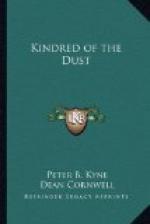“Folks—my own home folks,” Donald began, “to-day I formally take up the task that was ordained for me at birth. I am going to be very happy doing for you and for myself. I shall never be the man my father is; but if you will take me to your hearts and trust me as you have trusted him, I’ll never go back on you, for I expect to live and to die in Port Agnew, and, while I live, I want to be happy with you. I would have you say of me, when I am gone, that I was the worthy son of a worthy sire.” He paused and looked out over the eager, upturned faces of the men, women, and children whose destinies he held in the hollow of his hand. “My dear friends, there aren’t going to be any changes,” he finished, and stepped down off the platform.
From the heart of the crowd a lumberjack cried, “Ya-hoo-o-o-o-o!” as only a lusty lumberjack can cry it. “He’s a chip of the old block!” cried another, and there were cheers and some tears and a general rush forward to greet the new master, to shake his hand, and pledge allegiance to him.
When the reception was over, old Hector took charge of the homely games and athletic contests, and the day’s delights culminated in a log-burling contest in the Skookum, in which the young laird participated. When, eventually, he fell in the river and was counted out, old Hector donned his son’s calked boots and, with a whoop such as he had not emitted in forty years, entered the lists against the young fellows. In the old days in the Michigan woods, when burling was considered a magnificent art of the lumberjack, he had been a champion, and for five minutes he spun his log until the water foamed, crossing and recrossing the river and winning the contest unanimously. From the bank, Mrs. McKaye and his daughters watched him with well-bred amusement and secret disapproval. They could never forget, as he could, that he was The Laird of Tyee; they preferred more dignity in the head of the house.
The McKaye family drove home along the cliff road at sunset. Young Donald paused on the terrace before entering the house, and, stirred by some half-forgotten memory, he glanced across the bight to the little white house far below on the Sawdust Pile. The flag was floating from the cupola, but even as he looked, it came fluttering down.
Donald turned toward the McKaye flag. It was still floating. “The old order changeth,” he soliloquized, and hauled it down, at the same time shouting to his father within the house:
“Hey, dad; fire the sunset gun!”
The Laird pressed the button and the cannon boomed.
“We’ve neglected that little ceremony since you’ve been away,” he remarked, as Donald entered the room. “‘Other times, other customs,’ I dare say.”
He hurried up-stairs to dress for dinner (a formality which he disliked, but which appeared to please his wife and daughters), and Donald took his father’s binoculars and went out on the terrace. It had occurred to him that he had not seen old Caleb Brent and Nan at the barbecue, and he wondered why. Through the glasses, he could make out the figure of a woman in the cupola window, and she was watching him through a long marine telescope.




